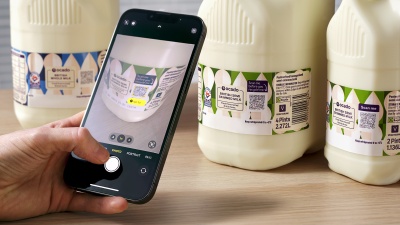
The digital deposit return scheme will encourage recycling through a 20p monetary reward for customers who scan one of 20,000 unique QR codes using their smartphones. The QR codes are printed onto Ocado’s own-brand two and four-pint milk bottles – which retail at £1.20 and £1.45 respectively – and are available for delivery nationwide.
The rewards will appear in a digital wallet in the Bower app and then can be withdrawn to their bank accounts. After the first 20,000 scans, consumers will be offered other benefits and perks instead of the 20p reward.
It is expected that 20p is the deposit to be used in the national deposit return scheme when it is implemented in 2025. Although consumers in this trial will not technically be redeeming a deposit – as it will not be added at the point of purchase – the partnership aims to demonstrate the viability of a digital deposit return scheme.
Laura Fernandez, Senior Packaging and Sustainability Manager at Ocado Retail Ltd, commented: “To be able to launch a workable digital deposit return scheme that actually pays consumers back for recycling is a game-changing move for recycling and the circular economy in the UK.
“We already know that Ocado shoppers have an appetite for such a scheme as when we surveyed them last year, 80 per cent were likely or very likely to scan a QR code for a deposit return.”
The serialised codes – made using standard industry printing processes at Interket UK – can only be scanned once, preventing consumers from repeatedly claiming back a deposit from the same pack. Additionally, the Bower app uses in-app GPS technology to validate that the consumer is claiming a 20p by standing within a close distance of a registered home recycling bin.
Collecting data through the digital deposit return scheme trial
Going forward, the QR codes will also allow brands to access real-time data on packaging lifecycles – including whether, when and where the packaging is recycled. The partnership hopes this will allow brands to streamline their operations and improve customer communications.
In addition to QR codes, invisible tags will be included on all product labels which will be counted in two regional material recycling facilities using Polytag’s invisible tag readers. This means data captured in the app when a consumer claims their 20p reward will be mapped to the count of items identified in the material recycling facilities, demonstrating a full end-to-end DDRS solution.
Although this is the first time Bower has partnered with a UK retailer to offer monetary rewards, Polytag and Ocado Retail last year printed QR-codes on five million milk bottles. When scanned, the codes took consumers to a landing page containing customised information which was developed in workshops between WRAP, RECOUP, Behaviour Change, British Retail Consortium and OPRL.
Alice Rackley, CEO of Polytag, commented: “In its response to the DRS consultation in January, the UK Government encouraged innovators to continue to demonstrate that the technology for a DDRS exists. Our partnership with Bower and Ocado Retail is the next step in demonstrating the viability of a DDRS in the UK.
“After successfully mass-applying five million unique-every-time QR codes to Ocado Retail’s packaging, we will now further conduct a proof of concept – consumers receiving monetary rewards for good recycling habits. We are excited to analyse consumer interaction with the codes, and strongly believe this could be a breakthrough moment when it comes to recycling in the UK.”
Environmental consultancy Resource Futures recently estimated that a digital deposit return system would result in cost savings of £3.4bn over an 11 year period, compared to conventional DRS, because it would negate the need for reverse vending machines to be installed countrywide.
Suwar Mert, CEO and Founder, Bower, added: “Consumers can now embark on a rewarding recycling journey by using mobile phones and regular recycling bins. Over 500,000 users are already using the app and get rewarded not only for their bottles and cans but for all packaging with a barcode. We can elevate the recycling rates and put speed and scale behind the transition towards a circular packaging economy”.







